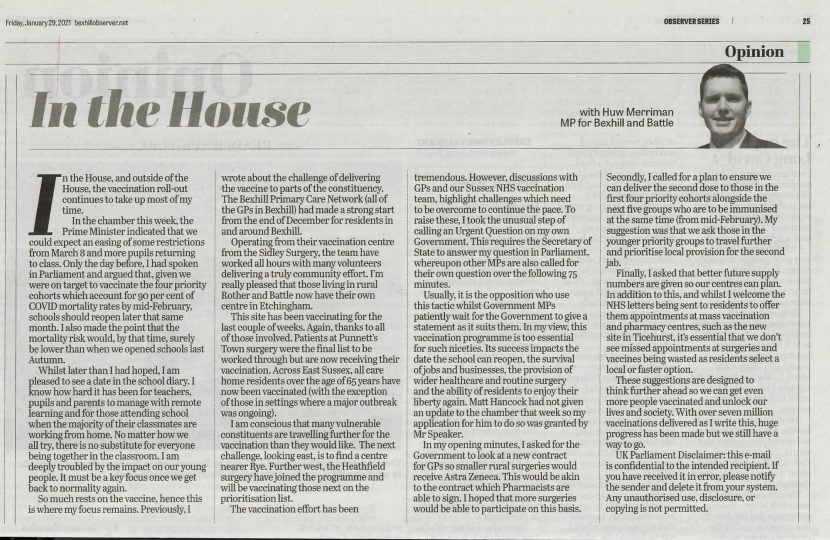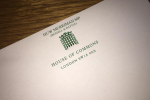
In the House, and outside of the House, the vaccination roll-out continues to take up most of my time.
In the chamber this week, the Prime Minister indicated that we could expect an easing of some restrictions from March 8th and more pupils returning to class. Only the day before, I had spoken in Parliament and argued that, given we were on target to vaccinate the four priority cohorts which account for 90% of COVID mortality rates by mid-February, schools should reopen later that same month. I also made the point that the mortality risk would, by that time, surely be lower than when we opened schools last Autumn.
Whilst later than I had hoped, I am pleased to see a date in the school diary. I know how hard it has been for teachers, pupils and parents to manage with remote learning and for those attending school when the majority of their classmates are working from home. No matter how we all try, there is no substitute for everyone being together in the classroom. I am deeply troubled by the impact on our young people. It must be a key focus once we get back to normality again.
So much rests on the vaccine, hence this is where my focus remains. Previously, I wrote about the challenge of delivering the vaccine to parts of the constituency. The Bexhill Primary Care Network (all of the GPs in Bexhill) had made a strong start from the end of December for residents in and around Bexhill. Operating from their vaccination centre from the Sidley Surgery, the team have worked all hours with many volunteers delivering a truly community effort.
I’m really pleased that those living in rural Rother and Battle now have their own centre in Etchingham. This site has been vaccinating for the last couple of weeks. Again, thanks to all of those involved. Patients at Punnett’s Town surgery were the final list to be worked through but are now receiving their vaccination. Across East Sussex, all care home residents over the age of 65 years have now been vaccinated (with the exception of those in settings where a major outbreak was ongoing).
I am conscious that many vulnerable constituents are travelling further for the vaccination than they would like. The next challenge, looking east, is to find a centre nearer Rye. Further west, the Heathfield surgery have joined the programme and will be vaccinating those next on the prioritisation list.
Vaccination effort has been tremendous. However, discussions with GPs and our Sussex NHS vaccination team, highlight challenges which need to be overcome to continue the pace. To raise these, I took the unusual step of calling an Urgent Question on my own Government. This requires the Secretary of State to answer my question in Parliament, whereupon other MPs are also called for their own question over the following 75 minutes. Usually, it is the opposition who use this tactic whilst Government MPs patiently wait for the Government to give a statement as it suits them. In my view, this vaccination programme is too essential for such niceties. Its success impacts the date the school can reopen, the survival of jobs and businesses, the provision of wider healthcare and routine surgery and the ability of residents to enjoy their liberty again. Matt Hancock had not given an update to the chamber that week so my application for him to do so was granted by Mr Speaker.
In my opening minutes, I asked for the Government to look at a new contract for GPs so smaller rural surgeries would receive Astra Zeneca. This would be akin to the contract which Pharmacists are able to sign. I hoped that more surgeries would be able to participate on this basis. Secondly, I called for a plan to ensure we can deliver the second dose to those in the first four priority cohorts alongside the next five groups who are to be immunised at the same time (from mid-February). My suggestion was that we ask those in the younger priority groups to travel further and prioritise local provision for the second jab. Finally, I asked that better future supply numbers are given so our centres can plan. In addition to this, and whilst I welcome the NHS letters being sent to residents to offer them appointments at mass vaccination and pharmacy centres, such as the new site in Ticehurst, it’s essential that we don’t see missed appointments at surgeries and vaccines being wasted as residents select a local or faster option.
These suggestions are designed to think further ahead so we can get even more people vaccinated and unlock our lives and society. With over 7 million vaccinations delivered as I write this, huge progress has been made but we still have a way to go.



